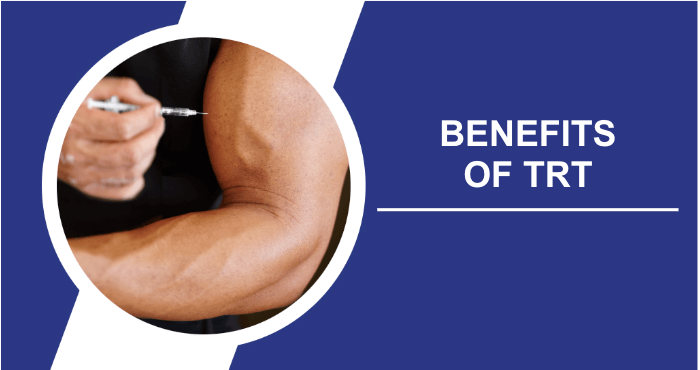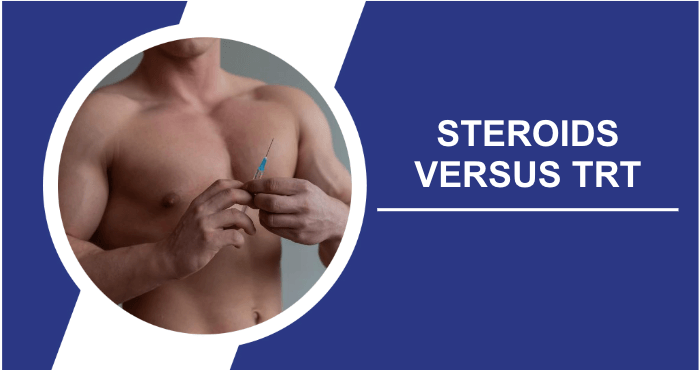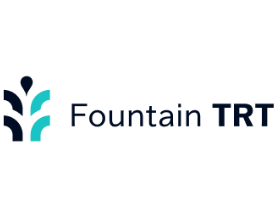When it comes to performance enhancement, the line between acceptable medical interventions and illicit substances can be quite confusing. A prime example of this is the distinction between steroids and testosterone replacement therapy (TRT), as there is a common misconception that TRT is synonymous with steroids.
In this examination of steroids versus TRT, we aim to dispel the ambiguity by explaining their fundamental differences and implications for individuals seeking to optimize their hormonal balance and enhance their performance.
About TRT And Steroids
How Can I Generally Maximize My Training Success?
To maximize your overall training success, it’s important to maintain a balanced approach. Focus on setting clear, achievable goals, be consistent in your efforts, and embrace both your successes and setbacks as learning opportunities. Seek support and feedback from mentors or peers, and remember that patience and dedication are your allies on the path to continuous improvement.
What Is The Definition Of Steroids?
Anabolic androgenic steroids are synthetic derivatives of testosterone produced by human intervention. They fall into the category of performance-enhancing substances known as androgens and have the potential to promote muscle mass development, strength enhancement, and overall performance optimization. Medical professionals legitimately prescribe anabolic steroids to treat conditions that lead to muscle wasting, hormonal imbalances, and even delayed onset of puberty.
In certain cases, steroids help to increase bone density and muscle mass, thereby improving overall well-being. Outside of the medical context, athletes, bodybuilders, and strength competitors often abuse anabolic steroids in their pursuit of a competitive edge. They believe that these substances can increase muscle size, enhance strength, and speed recovery. Regulations regarding anabolic steroids vary from country to country.
In general, their possession without a valid prescription is illegal, and they are often classified as controlled substances. As a result, possession of anabolic steroids without a legitimate prescription is considered illegal in many regions of the world. This prohibition is due to the risks of abuse, health hazards, and the unfair advantages they provide in sports. Abuse of anabolic steroids can lead to a number of health complications.
In the United States, the possession and use of anabolic steroids without a valid medical prescription is prohibited by law. Various state and federal penalties exist for those who abuse steroids, including fines and imprisonment. The Drug Enforcement Administration (DEA) is responsible for enforcing these laws regarding steroids. Numerous sports organizations have banned the use of anabolic steroids.
- Accurate testosterone measurement
- Appointment with a doctor
- Cream and injection options
- Price: $35 – $199
- Rating ⭐⭐⭐⭐⭐
What Is TRT?
Testosterone Replacement Therapy (TRT) is a medical intervention designed to increase an individual’s testosterone levels. Testosterone serves as the primary anabolic hormone, controlling the development of male sexual characteristics, muscle growth, and libido. Both men and women produce testosterone, but men produce it at about twenty times the rate of women.
In females, testosterone is produced in the ovaries and adrenal glands, while in males it is produced primarily in the testes, with a surge in levels during puberty. This surge facilitates the transition from childhood to adulthood, manifesting itself in deepening of the voice, growth of facial hair, and strengthening of bones and muscles. Testosterone also affects mood, energy levels, and cognitive function.
In men, low testosterone levels can lead to symptoms such as decreased energy, weakness, decreased libido, loss of muscle and bone mass, depression, and general lethargy. Individuals with less than 300 ng/dL of testosterone in their bloodstream are clinically diagnosed with hypogonadism or low testosterone levels. The decline in testosterone levels can be attributed to factors such as aging, certain medical conditions, and lifestyle choices.
TRT is a medical solution that a doctor may prescribe to treat hypogonadism. This treatment involves administering exogenous testosterone to the body through various methods, including injections, gels, patches, or implanted pellets. The goal of testosterone medications is to raise testosterone levels to a normal and healthy range, thereby relieving the symptoms associated with low testosterone, commonly referred to as “low T.”
Are TRT Steroids?
No, TRT (Testosterone Replacement Therapy) is not the same as anabolic steroids. Although the synthetic testosterone used in TRT is a type of steroid hormone, there are significant differences between it and the illegal steroids commonly used for physical enhancement purposes. Let’s delve into the specific properties and roles of each in the following sections.
The Contrast Between Steroids And Testosterone Replacement Therapy
Both TRT and steroids introduce synthetic testosterone into the body, but for different purposes, risks, and legal considerations. Let’s dissect these differences:
Purpose
- Steroids: Individuals use anabolic steroids with the intention of enhancing muscle mass development, optimizing overall physical performance, accelerating post-exercise recovery, and increasing strength. The primary goal is to artificially elevate testosterone levels above the natural range.
- TRT: This is a medically prescribed regimen designed to treat hypogonadism or inadequate testosterone levels. Before receiving such treatment, individuals must undergo a series of evaluations to determine the need. In general, men whose blood testosterone levels fall below 300 ng/dL qualify for TRT. The goal of treatment is to increase and normalize testosterone levels and relieve the symptoms of low testosterone.
Legality
- Steroids: Possession of steroids without a legitimate medical prescription is considered illegal in many regions, including the United States. Consequences can include fines and imprisonment.
- TRT: Medically prescribed TRT is legally sanctioned. Consequently, individuals undergoing TRT can legally possess synthetic testosterone, provided they can produce a valid prescription.
Control And Monitoring
- Steroids: Steroid users often self-administer the substance without professional supervision. In the absence of professional guidance, individuals often obtain these substances through illicit means, resulting in significant health risks.
- TRT: Throughout TRT treatment, a healthcare provider oversees administration and closely monitors the patient’s hormone levels and overall health. The goal is to maintain therapeutic testosterone levels and mitigate potential adverse effects.
Dosage And Administration
- Steroids: Users of anabolic steroids often use testosterone doses that exceed the body’s natural production of the androgen hormone.
- TRT: TRT is designed to restore an individual’s testosterone levels to their physiological norm. As such, dosages are closely monitored by a physician and may be adjusted based on diagnostic findings. This approach reduces the risk of excessive testosterone levels and their associated complications.
Health Risks
- Steroids: Abuse of anabolic steroids can lead to serious health complications, including cardiovascular disease, liver problems, hormonal imbalances, mental disorders, and addiction.
- TRT: This treatment is closely monitored to minimize potential side effects and is generally considered safe. However, like any medical procedure, it carries potential risks and side effects that should be carefully monitored and managed by a health care professional.
Research
Studies investigating the benefits and risks of TRT are often limited in size and use unrealistic doses. As a result, the scientific consensus on this issue remains unclear. A 2014 meta-analysis published in the Journal of Sexual Medicine conducted a comprehensive review of previous randomized controlled trials evaluating the effects of TRT.
The results indicated that TRT can improve erectile dysfunction and libido. In addition, restoring testosterone levels to normal with TRT was found to reduce the risk of prostate problems and venous thromboembolism.
Benefits Of TRT

Compared to anabolic steroid abuse, testosterone replacement therapy (TRT) offers significant advantages for individuals diagnosed with clinically low testosterone levels (hypogonadism). TRT offers numerous advantages over the illicit use of anabolic steroids. Here are the main advantages of TRT:
Medical Supervision
TRT is administered under the guidance of a licensed health care professional, ensuring that the treatment is tailored to the patient’s specific needs and medical condition. It is a legitimate therapy designed to treat genuine hormonal deficiencies.
In contrast, anabolic steroids are often abused without medical supervision, resulting in unregulated and potentially dangerous use. Users often self-administer, putting themselves at risk of incorrect dosing and inadequate monitoring for potential adverse effects.
Safety And Wellness
TRT is designed to reduce the risk of elevated hormone levels by restoring testosterone levels to the normal physiological range. When used as directed for a legitimate medical purpose, it is associated with reduced health risks.
Health Concerns
Abuse of anabolic steroids can lead to a number of health risks, including cardiovascular problems, liver damage, hormonal imbalances, and psychological effects. High doses of synthetic steroids used for performance enhancement can be particularly harmful.
Legal Compliance
When prescribed by a qualified health care professional – explore the best trt clinic here – for a legitimate medical condition, TRT is a legal and regulated medical treatment. Individuals who adhere to their approved treatment plan for TRT are not subject to legal repercussions. On the contrary, the use of steroids without a valid prescription is illegal in many jurisdictions, exposing individuals to potentially serious legal consequences if they choose to follow this path.
Therapeutic Treatment
The primary goal of TRT is to treat low testosterone levels. By restoring testosterone to normal levels, it can alleviate symptoms such as weakness, loss of muscle and bone mass, fatigue, sexual dysfunction, and depression.
In contrast, although anabolic steroids can provide temporary improvements in muscle growth and strength, these gains tend to disappear when discontinued. The long-term consequences can be severe, including psychological problems and hormonal imbalances.
Personalized Treatment
TRT is tailored to the specific needs of each patient, ensuring that testosterone levels are optimized while minimizing potential side effects. In addition, testosterone treatment is individualized to address specific medical conditions. In contrast, anabolic steroid users often take a one-size-fits-all approach, exposing themselves to excessive dosages with unpredictable and dangerous results, including adverse physical and psychological effects.
- Accurate testosterone measurement
- Appointment with a doctor
- Cream and injection options
- Price: $35 – $199
- Rating ⭐⭐⭐⭐⭐
Side Effects Of TRT And Steroids
It’s important to understand that both testosterone replacement therapy (TRT) and the improper use of anabolic steroids carry risks and side effects. However, when comparing these two approaches, there are significant differences in the severity and likelihood of these side effects. Here’s a comparison of the side effects and risks of TRT vs. steroids:
TRT
- Polycythemia: TRT can lead to increased production of red blood cells, potentially causing a condition called polycythemia. This condition increases the risk of blood clots, stroke, and other heart-related problems.
- Acne and skin conditions: Some people undergoing TRT may experience skin-related side effects such as acne. These effects are usually mild and manageable. In some cases, TRT may cause fluid retention, resulting in swelling or edema, but this side effect is usually temporary and treatable.
- Mood swings or irritability: While TRT can improve mood and energy levels in individuals with low testosterone, not everyone will experience these effects. In general, the mood-related side effects of TRT are less severe than the psychological effects associated with steroid abuse.
- Testicular atrophy: Long-term TRT can inhibit natural testosterone synthesis, potentially leading to testicular atrophy (shrinkage of the testes). However, this side effect can be reversed. There is also a theoretical risk that TRT could worsen prostate symptoms in individuals with pre-existing prostate problems, requiring regular monitoring to manage this risk.
- Working with a qualified personal: Working with a healthcare professional is essential to minimize the risks associated with TRT. A competent healthcare provider can monitor hormone levels, adjust dosages as needed, and address any potential complications or side effects.
Steroids
- Cardiovascular problems: Abuse of anabolic steroids significantly increases the risk of cardiovascular problems, including high blood pressure, heart attack, and stroke.
- Liver damage: Long-term or high-dose use of oral steroids can stress the liver and lead to liver damage, including the development of tumors.
- Hormonal imbalances: Steroid abuse can disrupt the body’s hormonal balance, resulting in testicular atrophy, infertility, and mental health problems, including “roid rage.
- Physical side effects: Common side effects of steroid abuse include hair loss, acne, and the development of male breast tissue (gynecomastia).
- Addiction and withdrawal: Abuse of steroids can lead to both psychological and physical dependence, along with withdrawal symptoms when use is discontinued.
Can Sports Exercises Increase Testosterone Levels?
Exercising regularly can actually have a positive effect on a person’s testosterone levels. When you break a sweat on the field or in the gym, your body releases endorphins, which reduce stress and promote overall well-being. This reduction in stress, combined with the physical demands of exercise, can help boost testosterone production.
In addition, exercises such as weightlifting and high-intensity interval training (HIIT) have been shown to be particularly effective in boosting testosterone levels. So not only does exercise keep you fit and energetic, it also contributes to a healthy hormonal balance, improving your vitality and athletic performance.
Why Do Testosterone Levels Change Throughout Life?
Testosterone levels fluctuate throughout a person’s life due to a complex interplay of factors. During puberty, testosterone surges, triggering the development of secondary sexual characteristics such as facial hair and deepening of the voice. In adulthood, testosterone levels remain relatively stable, promoting muscle growth and maintaining sexual function.
However, as men age, typically after the age of 30, testosterone levels begin to decline, leading to decreased energy, muscle mass and libido. Lifestyle choices such as diet, exercise, and sleep, as well as genetic factors, can influence these fluctuations. Hormonal changes are a natural part of the aging process, and understanding them helps individuals adapt and find ways to maintain their vitality and overall health.
Where Can I Get Testosterone?
Always ensure that testosterone is obtained legally under the supervision of a licensed healthcare provider. Because testosterone is a prescription drug, its use requires careful monitoring to ensure both its effectiveness and safety. Here are some safe and legal ways to obtain testosterone:
- Seek guidance from a healthcare professional: Begin the process by making an appointment with a healthcare professional. They will perform a blood test to assess your testosterone levels, evaluate your medical history, examine your symptoms, and determine your eligibility for testosterone replacement therapy (TRT).
- Get a prescription: If low testosterone levels (hypogonadism) or another medical condition requires TRT, your doctor will prescribe the appropriate form of testosterone therapy.
- Buy testosterone from a reputable source: Once you have a valid prescription, you can purchase testosterone from a pharmacy or a reputable online TRT clinic. Always make sure your supplier is properly licensed and regulated.
- Work with a health professional: When considering testosterone replacement therapy (TRT), prioritize safety and effectiveness by working with an experienced healthcare professional. Many people turn to online TRT clinics for convenient access to professional guidance and treatment options.
The Top Online TRT Clinic
If you’re ready to take the next step in determining your eligibility for TRT, we recommend contacting Fountain TRT for a comprehensive evaluation. Fountain TRT specializes in hormone replacement therapy and can provide personalized guidance and treatment options tailored to your specific needs and goals.
Prioritizing your health and well-being is paramount, and seeking guidance from experienced professionals can make the journey to hormone optimization safer and more effective. With trusted experts like Fountain TRT, you can embark on your TRT journey with confidence.
- Accurate testosterone measurement
- Appointment with a doctor
- Cream and injection options
- Price: $35 – $199
- Rating ⭐⭐⭐⭐⭐
Frequently Asked Questions
Is TRT monitored by anti-doping agencies like steroids are?
TRT is not subject to anti-doping regulations when used for legitimate medical purposes. Steroids are banned in most sports and monitored by anti-doping agencies.
Is TRT (Testosterone Replacement Therapy) the same as using steroids?
No, TRT and steroids are not the same. TRT is a medically supervised treatment for individuals with clinically low testosterone levels, while steroids refer to synthetic versions of testosterone often used illicitly for performance enhancement.
How does TRT differ from steroid use in terms of legality?
TRT is a legal and medically prescribed treatment, whereas using steroids without a prescription is typically illegal and considered doping in sports.
Can TRT be used to boost athletic performance like steroids?
TRT is intended to restore testosterone levels within a normal range for health purposes, not to enhance athletic performance. Steroids, on the other hand, are often misused for performance gains.
Are the side effects of TRT and steroids the same?
TRT is carefully monitored by healthcare professionals to minimize side effects, while steroids can lead to a wide range of adverse effects, including severe health risks.
Conclusion
Our extensive research into TRT versus steroids has revealed certain parallels and numerous differences. While anabolic steroids can provide fleeting performance benefits, they often carry significant health risks and the potential for legal ramifications if abused. Conversely, TRT is a medically supervised treatment designed to correct hormonal imbalances and improve overall well-being.
When combined with a balanced diet, consistent physical activity, adequate rest, and other positive practices, it will facilitate the achievement of your fitness and lifestyle goals. If you are considering TRT, your first step should be to assess your need for it. We strongly recommend using a reputable online TRT clinic to get the expert guidance you deserve. Be sure to read our review of the top online TRT clinics available on the market today.
Sources
- Testosterone replacement therapy. DOI: 10.1111/andr.12774. Read more
- Testosterone replacement therapy (TRT) and prostate cancer: An updated systematic review with a focus on previous or active localized prostate cancer. DOI: 10.1016/j.urolonc.2020.04.008. Read more
- Understanding and managing the suppression of spermatogenesis caused by testosterone replacement therapy (TRT) and anabolic-androgenic steroids (AAS). DOI: 10.1177/17562872221105017. Read more
- Testosterone Replacement Therapy for Sexual Symptoms. DOI: 10.1016/j.sxmr.2018.11.005. Read more

